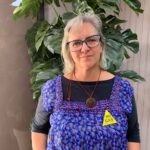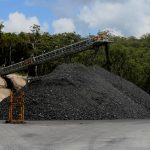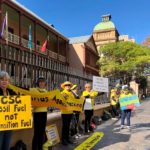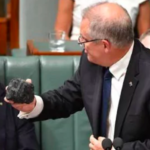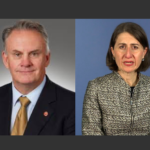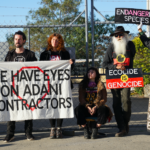We Will Stop the “Ludicrous” Narrabri Gas Project, Says Knitting Nannas’ Kathy McKenzie
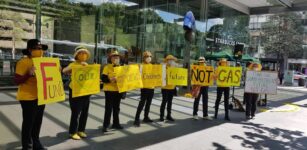
“It’s not a good look loading little old ladies with osteoporosis into paddy wagons.”
The NSW Independent Planning Commission (IPC) gave Santos approval to move ahead with its $3.6 billion Narrabri Gas Project on 30 September. The highly opposed plan would see 850 coal seam gas wells drilled across 1,000 hectares of the north western NSW Pilliga Forest and nearby grazing land.
The Great Artesian Basin sits below the forest. It’s one of the largest freshwater reserves in the world. And the Pilliga is a critical recharge area of the basin.
Santos plans to drill the over 800 wells straight through the basin to get to the gas below it. But not to worry, the Australian energy company says on its website that it won’t be a problem.
Despite the overwhelming majority of the 11,000 submissions to the IPC being opposed to the project, few were surprised it was greenlighted, as Scott Morrison had stuck his finger in the pie, as he indicated federal support for the project, which is part of a wider government push for gas.
And while federal environment minister Sussan Ley still has to sign off on it, she’s hardly going to oppose her boss the PM, or his seniors the Minerals Council of Australia and increasingly, the Australian Petroleum Production and Exploration Association.
Not fit for purpose
Revealing yet again that his vision for the future is the 1950s Menzies Era, the prime minister has proposed that the way out of the COVID-19 produced economic downturn is gas.
This is straight after the country suffered the brutal fossil fuel-induced bushfire crisis.
Morrison announced the details of the gas-led recovery on 15 September. It includes government support for five new gas fields, as well as fresh pipelines. And if AGL attempts to replace its Liddell coal-fired power station with renewables, well, the PM is going to intervene with a gas-fired facility.
As the Coalition continues to spruik gas as some sort of clean alternative for the nation to transition away from its beloved coal, it’s neglected to mention that the greenhouse effect of the methane involved in coal seam gas extraction is 80 times more potent than carbon emissions.
Indeed, at a time of multiple crises both on the national and international scenes, all Morrison and his ilk can do is come up with slightly different solutions to the problems that they’re unable to deal with because they’re too caught in the backdoor financial implications to even admit the issues exist.
Cross stitch mobilising
Established in June 2012, the Knitting Nannas Against Gas or KNAG has become a formidable force in the grassroots campaign to prevent the spread of coal seam gas across this state.
Originally coming from the Northern Rivers region, chapters of the Knitting Nannas have sprung up throughout NSW.
The Nannas use nonviolent direct action – knitting and blockading – to protest the ongoing destruction of the environment at a time when the climate crisis is escalating globally. And KNAG has long been a chief opponent of the Narrabri Gas Project.
Sydney Criminal Lawyers spoke to Sydney Knitting Nannas member Kathy McKenzie about the devastation the Narrabri project would wreck, the folly of the Morrison government’s push for gas, and why Santos ought to be concerned that the Nannas have its project in their sights.
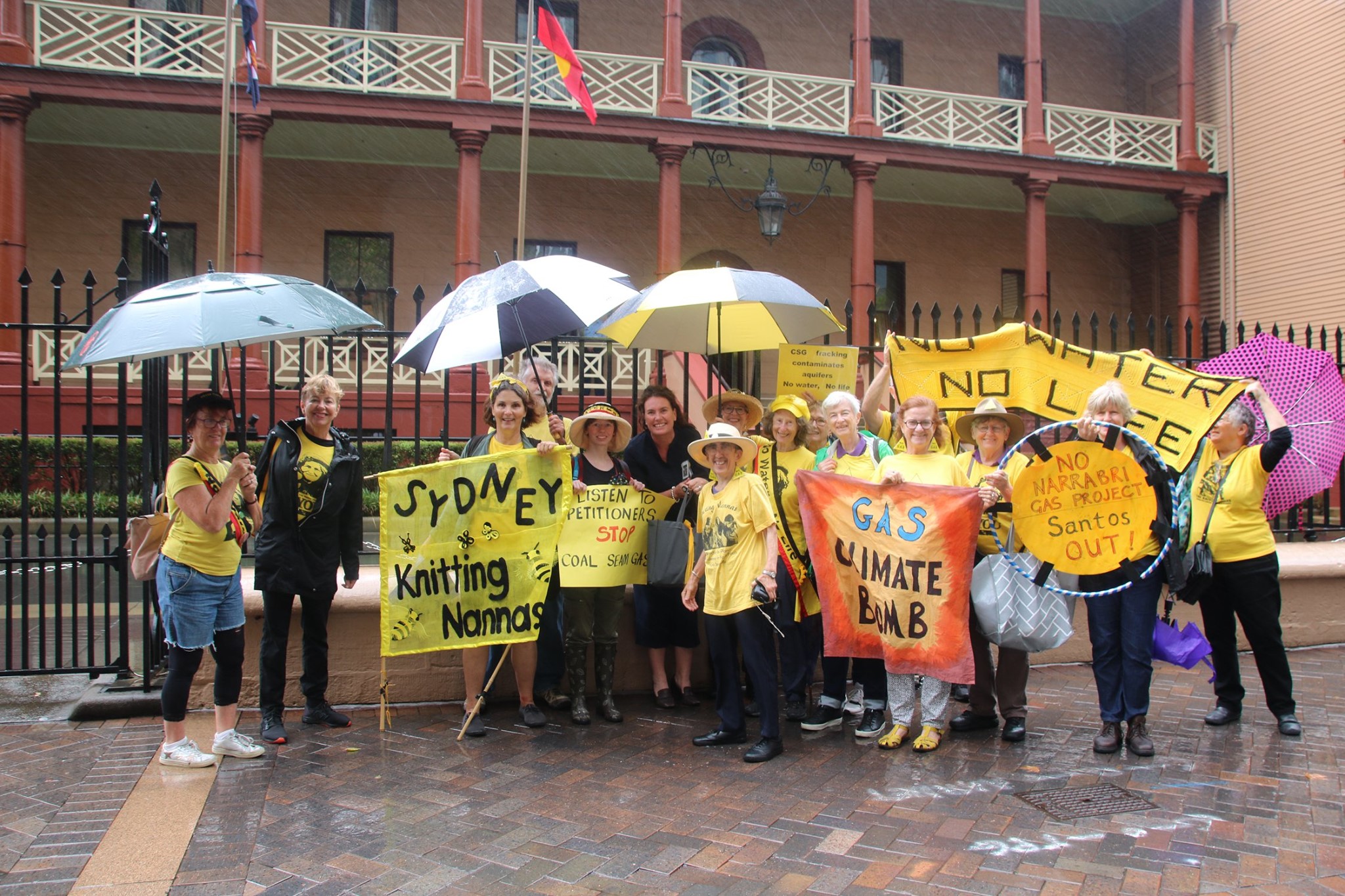
Firstly, the $3.6 billion Santos Narrabri Gas Project has been given the go-ahead by the NSW Independent Planning Commission. And it’s come with an accompanying 134 condition proviso.
The Knitting Nannas have long been mobilising against this project. Ms McKenzie, what was your reaction to the decision?
I’m angry but not surprised by the decision. I’m angry because I thought that after the bushfires, the scientific evidence presented during the IPC process and the overwhelming public opposition from all political and social sectors of the community, we should have reached a turning point for fossil fuel approvals in this state.
However, I am not surprised because the recent political pressure from the PM on the IPC to approve the project was immense and makes a sham of what is supposed to be an independent process.
Like many others, I am really angry about the PM’s foolish push for a gas-led recovery.
I haven’t studied the conditions thoroughly, but it appears that health issues have not been adequately addressed, and emissions and science have been ignored.
Where the commissioners could, they imposed conditions.
They were not allowed to address or consider insurance issues or the potential expansion of the project onto prime agricultural land covered by existing petroleum exploration licences (PELs), stretching from the Hunter to the Queensland border. These issues are of great concern to farmers and to us.
Santos is required to complete management plans before commencing stage one for noise, water, biodiversity, waste, Aboriginal and cultural heritage, historic heritage, fire and rehabilitation.
Five advisory groups need to be formed. And a field development protocol, a meteorological station, a produced salt beneficial reuse and disposal study, and an environmental management strategy have to all be in place too.
These management plans should have been in place before approval, therefore allowing the community an opportunity to scrutinise them and have their say.
Now it’s up to the planning secretary to approve these plans. Then the Environment Protection Authority and the NSW Resources Regulator have to monitor and enforce compliance.
The community does not trust these government agencies due to their past records, and the high costs and lack of funds to regulate properly.
This is just one of many unknown costs not factored into this already very expensive project. And who will pay – Santos or the taxpayer?
Some of the conditions will delay production and if properly enforced, some will add to the cost to what is believed to be the most expensive gas in Australia, if not the world.
There’s nothing in the IPC’s decision that reserves Narrabri gas exclusively for the NSW market. Perhaps that’s because we could buy gas cheaper elsewhere.
The proposed Santos Narrabri Gas Project would consist of 850 coal seam gas wells drilled throughout the Pilliga Forest. What sort of environmental damage would this project likely have on the local region?
Eight hundred and fifty gas wells drilled through the Great Artesian Basin (GAB) to the coal seam below will disintegrate with time and cause leakage from the GAB into the dewatered coal seam.
Salty water and brine brought up from the coal seam is likely to spill and cause contamination of ground and surface water.
The salts and toxins removed from the coal seam have to be stored somewhere and therefore, are likely to contaminate soils, ground and surface water.
As well as water, the project will impact on the biodiversity of the Pilliga Forest.
During the IPC hearings, many scientists spoke about the environmental damage the project would likely have on the local region. This has deepened our understanding of why this project is so wrong.
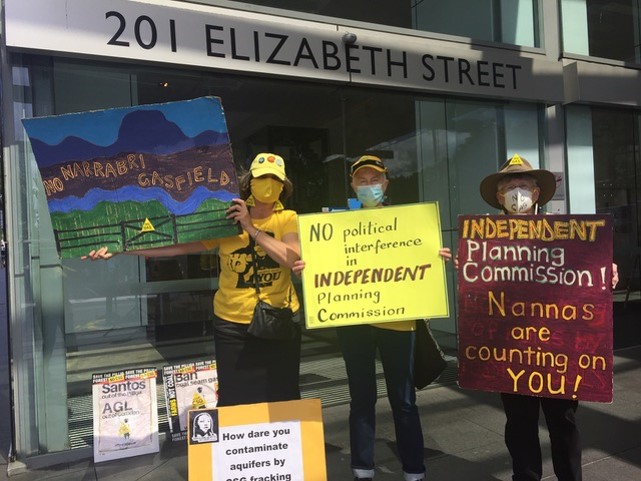
Gas has long been held up as a clean alternative to coal, however the methane it produces is more detrimental than carbon.
In your understanding, what sort of impact would the Narrabri project have on the current climate crisis Earth is facing?
Gas is not a clean alternative to coal. It’s a fossil fuel. My understanding is that shifting from coal to gas may reduce emissions but only if it is conventional gas, not unconventional gas from coal seams – in Queensland and Narrabri – or shale in the NT.
Gas burns with less emissions than coal but the processing and transporting of unconventional gas leads to lots of fugitive methane emissions, which have been underestimated for years.
If this project, or any new gas project, goes ahead it will add to our emissions for the next 20 to 30 years.
Approving any new fossil fuel project at this time diminishes even further Australia’s international reputation.
The world is turning to renewables and wants to buy goods produced with a low carbon footprint. Goods made from fossil fuels are expected to attract tariffs in the near future.
It’s gradually emerged over the last half year that the Morrison government is planning a gas-led recovery post-pandemic. This comes right on the back of the devastating climate-driven bushfire crisis.
What do you think about the government coming forth with this gas push straight after the crisis?
We have the best renewable energy sources in the world, and the technology and companies and individuals willing to invest in it. People are not lining up to invest in gas.
We have an amazing opportunity to become a renewable energy powerhouse. We could develop new industries that require large amounts of power but are willing to have flexible working hours to obtain the cheapest power in the world.
We should be leading the way in technology and innovation, or as Nannas say, “Lead by example”.
Initially, the federal government was overwhelmed by COVID. Lacking effective leadership ability, the PM was soon surpassed by the state premiers, who took control as they did during the bushfires.
The federal Coalition – obsessed with balancing the budget and keeping the economy going – had continually not listened to scientists on climate change.
This crisis must have been beyond their capabilities to manage. Why else would they turn to their donors, instead of the public service, to formulate a recovery plan?
Most of the initial commissioners had a strong interest in the gas industry, so it was no surprise they recommended a gas-led recovery.
When the government first touted the idea, many people objected and thought it so ridiculous they wouldn’t pursue it.
But they are determined to continue along this path, causing many to wonder – if no one voted for the gas industry, why is it running the country?
Do you think the government had the gas agenda in the works prior to any COVID downturn?
Not sure, but the National Party has long been a big supporter of the Narrabri Gas Project, or one could say the mining industry has long been a supporter of the National Party.
And the revolving door between all sides of parliament and the gas industry is well documented.
Since the announcement that the IPC has given Santos the greenlight, a lot of people have indicated that it’s time for grassroots groups to move in and stop the project.
How large would you say the opposition to the project is? And what parties does it consist of?
The opposition to this project is huge and growing. There are over 300 groups across all demographics.
They’re from all political persuasions, socioeconomic communities, of all ages and from many areas across NSW.
This project has united communities against it. Friendships have developed and strengthened within and between the groups. New members are always welcome – it’s about finding the group that represents your interests the best.
Zoom has kept each group informed and working together during COVID and has made it a lot easier for all the groups to connect with each other.
Many people are very angry about the government’s stance on climate change. During and after the bushfires, people in Martin Place were snatching a petition against the project out of our hands they were so keen to sign.
Now they’re furious about a gas-led recovery and it’s not just people in the streets. Scientists, academics and many high-profile people are speaking out against it.
Lots of people are against this project and any new gas projects. Many are not members of a group and that’s fine.
Some appeared at the IPC hearings, others wrote submissions, some turn up to protests, others write letters and/or contribute funds.
There are many ways to become involved in this fight. Just talking with friends and family about the issues creates more awareness.
Some people might think that a group of grandmothers knitting doesn’t pose much of a threat to big mining companies.
Why should corporations like Santos be concerned about KNAG being opposed to its Narrabri project?
Knitting Nannas are recognised for the work they do. When we walk down Sydney streets, people come up and tell us we are doing a good job. They give us a thumbs up, or do a friendly honk as they pass by. They listen to their Nannas.
It’s important to Knitting Nannas that our grandchildren know that we have tried to make the world a better place for them. That’s why we promote intergenerational equity, otherwise known as “what about the kiddies”.
Expert scientific evidence at the IPC hearing made it clear that environmental damage may not become apparent for many years and future generations will have to pay to remedy it.
The “kiddies” grow up and vote. Nannas support the Strike4Climate movement. The strikers influence their peers, families and those younger than them.
They’re our greatest hope, a force to be reckoned with and the future leaders of this country. They will remember the political parties and companies that have ignored the science and don’t act to reduce emissions.
Over this year, we have watched the opposition to this project grow enormously and this alone ensures our success. We will never give up because we know we are right, and history will prove it.
How have the Knitting Nannas proven their mettle in the past?
Knitting Nannas were involved in the Bentley Blockade which resulted in Metagasco’s licence being suspended and eventually, it was bought back by the government along with many others.
Nannas were involved in the successful campaign to stop AGL’s gas field at Gloucester. Along with many others, Nannas have delayed the Narrabri Gas Project and we will stop it.
Nannas are also involved in protecting the environment from coal mining and logging in their local areas and they are supported by other nannas from other areas.
Nannas have come together over the Narrabri Gas Project because they started with coal seam gas and they’re determined to stop it across NSW.
If this project goes ahead it will expand, as I mentioned earlier. Already other companies have announced they’re starting up exploration again.
I can’t see how the expenditure on infrastructure for Narrabri gas can be economical unless they develop other gas fields nearby.
The development of a gas industry in NSW will lock us into gas for at least 30 years. But by the time gas is produced it will be outdated by new technology and renewables. It’s a ludicrous project and investors know it.
And lastly, Ms McKenzie, the IPC has given Santos approval for the Narrabri project. And while the environment minister still has to sign off on it, most would be gobsmacked if she doesn’t give approval.
So, that leaves us with grassroots people power. What’s the next step from here as far as KNAG is concerned?
We’re busy plotting our next moves, but I am not at liberty to divulge our intentions. We like surprises.
But we will be closely watching Santos and the government to ensure that the conditions are strictly adhered to.
We will continue to campaign against the federal government’s idiotic gas-led recovery plan.
We will continue to meet with politicians and public servants. We will also email them to let them know when we are angry, but we will also give them credit if they do the right thing.
We will continue to create more community awareness through social media and COVID safe actions. And we will support and participate in larger actions and campaigns with other groups.
If something is happening – Knitting Nannas will be there.
We will do whatever it takes to stop this project. I along with many other Nannas are prepared to get arrested.
It’s not a good look loading little old ladies with osteoporosis into paddy wagons.


